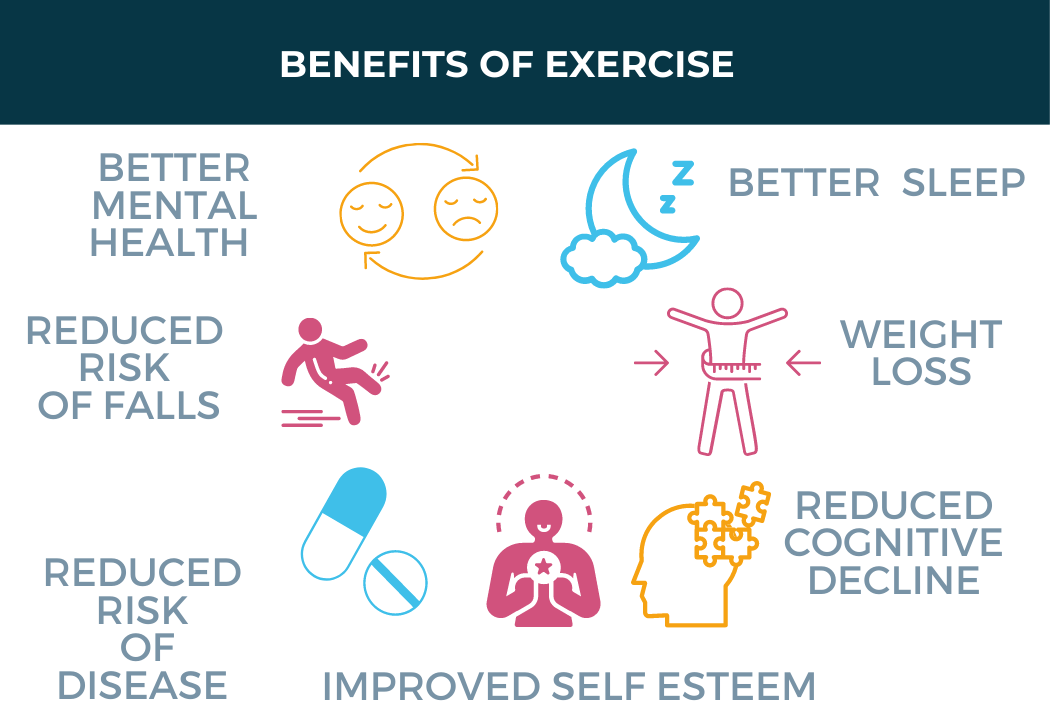The UK Chief Medical Officer said “If physical activity were a drug, we would refer to it as a miracle cure, due to the great many illnesses, it can prevent and help treat.”
Exercise and physical activity can prevent illness and help to manage long term health conditions. For good physical and mental health, adults should aim to be physically active every day. Any activity is better than none, and more is better still.
Strength, balance and flexibility
This is about keeping the muscles strong and flexible. When we reach our 50s strengthening exercise helps to delay the natural decline in muscle mass and bone density. Once we are over 65 strengthening helps to preserve strength as much as possible to maintain independence.
Balance and flexibility exercises are especially important for older adults. Improving balance and co-ordination helps to reduce the risk of falls as well as maintain mobility. Improving flexibility can improve posture, reduce aches and pains and lower the risk of injury.
Cardiovascular exercise
Cardiovascular exercise is activity that gets your heart rate up and your blood pumping such as brisk walking, running, cycling, swimming, aerobics classes – anything that gets you out of breath. If gardening or housework makes you a little out of breath that counts towards your exercise for the week!
Sedentary time
This is time spent without moving – sitting at a desk working, or reading, or watching TV. We should aim to minimise our sedentary time by breaking up long periods of inactivity. This might be getting up to make a drink, going for a short walk, standing and stretching, or can even be just standing up and sitting down again a few times every hour or two.
How about people with disabilities or long term conditions?
“If exercise were a pill it would be one of the most cost effective drugs ever invented” Dr Nick Cavell Health promotion consultant
Exercise can help to prevent and manage many diseases and long term conditions (LTCs) such as type 2 diabetes, cardiovascular diseases and osteoarthritis – too many to name here! For many conditions, physical activity is as good or better than treatment with drugs and has a much lower risk of any harm.
Exercise is just as important for people with disabilities and LTCs. It can be very challenging to work on fitness when you have a disability or LTC and it needs to be done at an appropriate level, but for many it is possible to establish an exercise regimen to build fitness and aim for the same level of activity as the rest of the adult population.
How do I start?
Firstly remember that any exercise or physical activity is better than none at all. If the recommended amounts seem way out of reach just start with a little bit. Maybe a walk around your garden, or a walk around the block, climbing the stairs more often – every little bit helps and as you feel fitter and stronger you can build up.
The key is to find something that you will enjoy so that you will keep going, set some goals to keep motivated. Start slowly and gradually build up, don’t worry if you have some muscle aches, but if pain persists you need to ease off a bit and go more slowly. It can help to exercise with someone else for added motivation and support. Try to make exercise a habit, it can help to exercise at the same time every day, or day of the week. The first few weeks will need a lot of motivation, but after that, if you keep it up exercise will become a habit and you may even miss it if you don’t exercise!
There are some good resources at www.nhs.uk/better-health/get-active/
If you are in doubt or concerned about starting to exercise you can contact an appropriately trained professional or discuss it with your GP. People with uncontrolled symptoms of cardiac, metabolic, renal and some musculoskeletal conditions should seek advice before starting exercise.
About us
We are a team of experienced physiotherapists and physiotherapy assistants working with people with neurological and vestibular problems. Emma Thomas heads the team and has been a neurological physio for over 22 years. We are dedicated to helping people to make the most of their abilities and to reach their full potential. We have a fully equipped clinic and exercise room or can work in your home, the gym, swimming pool, outdoors or where ever works best for you!
Emma Thomas and Associates
Millennium Hall Health Centre, Astrop Rd, King’s Sutton, Banbury OX17 3PG
07958 611861









